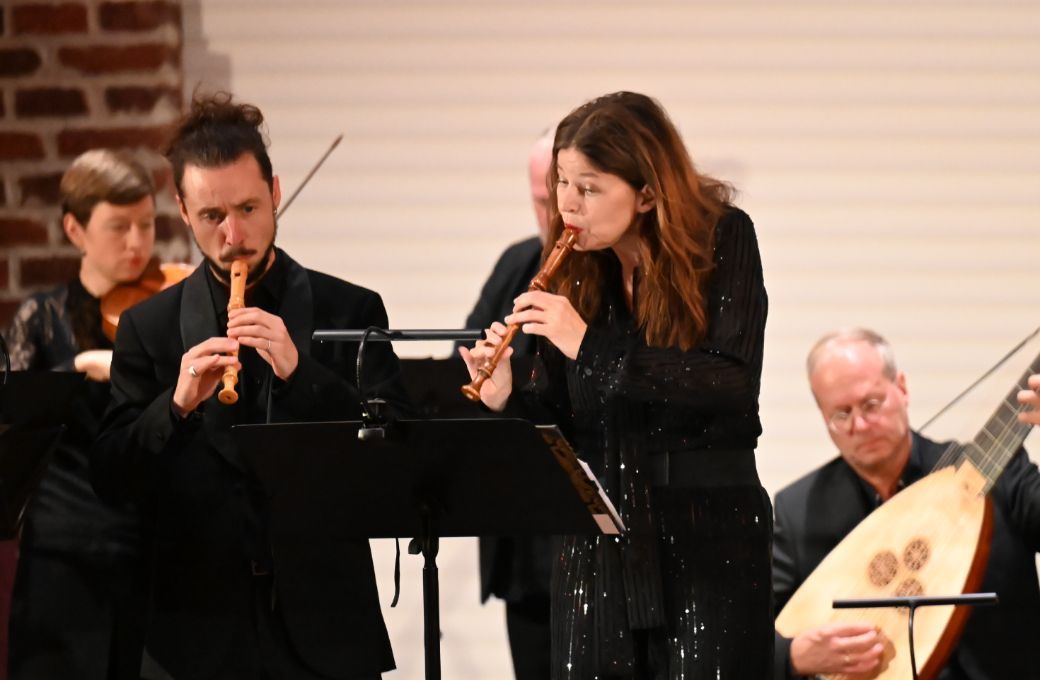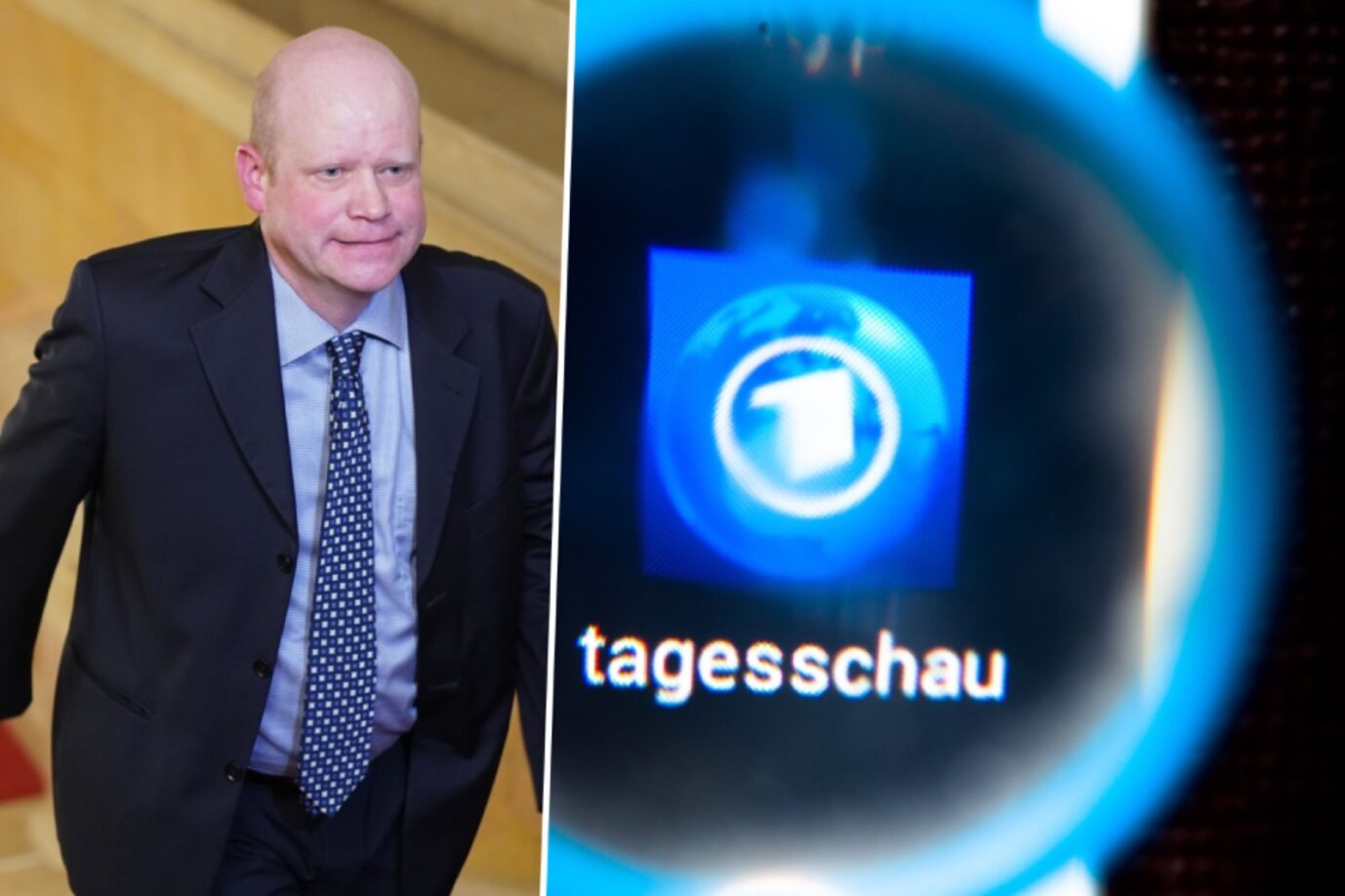There is war in Europe once again. Many in our civilisation had almost forgotten it. But autocratic, fanatical nationalists are not making our western achievements of the modern era their own. Instead, they are exploiting the pacifism of democracies that has also arisen as a result, which blocks out the actions of war-mongering extremists and enables killing. However, the desire for peace is shared by all civilised people. And of course this is especially true of those from past centuries. These include scholars such as Erasmus of Rotterdam and composers who, out of necessity and cheerfully, described the reality and desire for change.
Dorothee Oberlinger with the Academy of Early Music Berlin
© Michael Rathmann
The Academy for Early Music Berlin and Dorothee Oberlinger presented a small excerpt from the instrumental baroque at the Knechtsteden Early Music Festival, where the recorder player and conductor is the first resident artist of the post-Max era and the orchestra is making its debut. Quite obvious, like Biber’s mood cannon Battle to 10was thereby bypassed, even if Schmelzer’s Fencing school then found its obligatory place in the program. The ensemble, which performed solo in the high baroque repertoire and played under the direction of concertmaster Georg Kallweit, gave it the emotional elegance of the sporting art of cutting on the one hand, and on the other hand, of course, the clear danger of the enemy’s thrusting weapon, which was testified to by the tired sighs of the treated in the concluding “Bader Aria”. Biber, on the other hand, made himself a real sensation with the Sonata X from the Sonatas serving both the air and the halls Hearing, in which trumpeter Ute Hartwich, with her brilliantly rounded tone, breathed dignity and splendor into the courtly diversion and the hoped-for diplomatic ceremonial.
With Pogliettis Triosonate in C Oberlinger on soprano and the Akamus with Hartwich as co-soloist and bassoonist Claudius Kamp impressively complemented the Kremsier connection. Storaces Battle Dance in turn joined the then popular genre of Instrumental ballet and a mixed affect of Flóra Fábri on the harpsichord, with a somewhat articulatorily restrained attack and instead noticeable thoughtfulness as well as greater agogic influence.
The evening’s musical opening of the war took place with a mini-suite of two Handel operas. Alcinawhich Oberlinger will conduct in the Bonn Opera House from November, and Rinaldoboth based on Tasso’s Crusade epic. While Oberlinger alternates between soprano and sopranino in the three-movement Rinaldo-Sinfonia fought with Kallweit and in Alcina-Entrée smooth longing for peace, Kamp swung the tambourine in the introductory war dance for the notorious Rinaldo-Battaglia with trumpet and the trembling of the bass bows replacing the timpani. The recorder player and the ensemble presented themselves in phrasing, dynamics and balance as a familiar community of fate, capable of inspiring implementation. This was followed by excerpts from the third Tasso version of Geminiani, The Enchanted Forestwhich is now picturesque artillery, no, baroque Arcadia place of ceasefires that have been achieved in the meantime. And this was celebrated with Oberlinger and Kamp, calling out a pleasant voice flood, vulnerable and finally with trumpet (but without horns).
Dorothee Oberlinger with the Academy of Early Music Berlin
© Michael Rathmann
For the explicit solo recorder part, Oberlinger turned to Vivaldi, who, however, also had a fiery string symphony of the Armida Such a threat to the habitat of the sopranino, which is interestingly early/high baroque, chirping Gardellinowho triumphed over the first violin with his throaty tongue and manual piano skills as a teasing siren of the perfect world. Something eerie, stimulating and peaceful also has the Night in itself, which the soloist performed with all routine and yet always fresh fascination with pictorial and ponticello-like colors on the late baroque alto; and which with Rameau’s “Entrée de Polymnie” (The Boreades) made the dream of utopia possible.
In between, the actor Michael Witte recited in an angry and admonishing imitation the blunt Erasmus with excerpts from his Lament for PeaceThe pacifist counter-proposal to the idea of the comparatively more realistic international law of war as a means against the otherwise deterrent law of the strongest through perversion. He left the harsh accusation against the then secular and spiritual “inhumans” and their “hellish madness” to the “appeal to reason” and the respective consequences. Today’s discussion points also include the change of eras proclaimed by war.
****1


